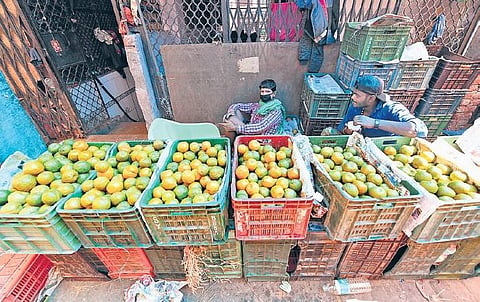

VIJAYAWADA: After announcing 2020-21 as the year of coconut, the Horticulture Department named 2021-22 as the ‘Year of Citrus’. A committee of experts from Dr YSR Horticulture University has come up with an action plan to improve citrus fruits cultivation in the state and focus on resolving problems of citrus farmers and provide a way forward for citrus cultivators to get optimum yield and revenue during the next one year.
Minister for Agriculture and Horticulture Kurasala Kannababu on June 8 announced the year 2021-22 as ‘Citrus Year’ and called on scientist community to come up with new methods and technologies for optimum post harvest process like transportation and storage and provide the same to farmers cultivating different kinds of citrus fruits in the state.
In Andhra Pradesh, two citrus fruits — sweet orange and acid lime — are cultivated extensively, mostly in Rayalaseema districts of Kadapa, Anantapur and south coastal districts of Nellore and Prakasam and to an extent in Guntur, West Godavari and East Godavari districts.
Sweet orange, which in local parlance is called ‘Chini’, is cultivated in 95,982 hectares. The Sathgudi variety and to some extent Batavian (Bathaya) is cultivated in the state. Acid lime is cultivated in 43,000 hectares and the production comes to around seven lakh metric tonnes. Balaji and Petturu, canker tolerant varieties developed in Tirupati and Petturu, are also cultivated in the state.
Six lakh acid lime saplings of Balaji variety from the centres of ICAR-AICRP on fruits in Tirupati have been supplied to farmers till date, which may improve the yield per hectare. With the increasing demand for sweet oranges, more farmers in the State are coming forward to take up the crop. However, both acid lime and sweet orange cultivators in the state have several problems that need the attention of the agriculture scientific community and finding solutions for these problems will be the focus this year.
Horticulture university vice-chancellor T Janakiram, who was behind the concept of naming every year after a particular horticulture crop and focusing attention on improving yield and other aspects, said disease-free high yield saplings of sweet orange and acid lime will be provided to farmers. Adopting post-harvest technologies for improving exports of these fruits, crop management training for farmers at RBKs, research on pest and rot tolerant varieties and wider publicity for indigenous varieties will be the top priority.
Horticulture University came up with a month-wise action plan for the year, which includes online training programmes, plantation of citrus seedlings in educational institutions, phone-in programmes for farmers, training in value addition through RBKs, organising Kisan Mela after Covid pandemic is under control.